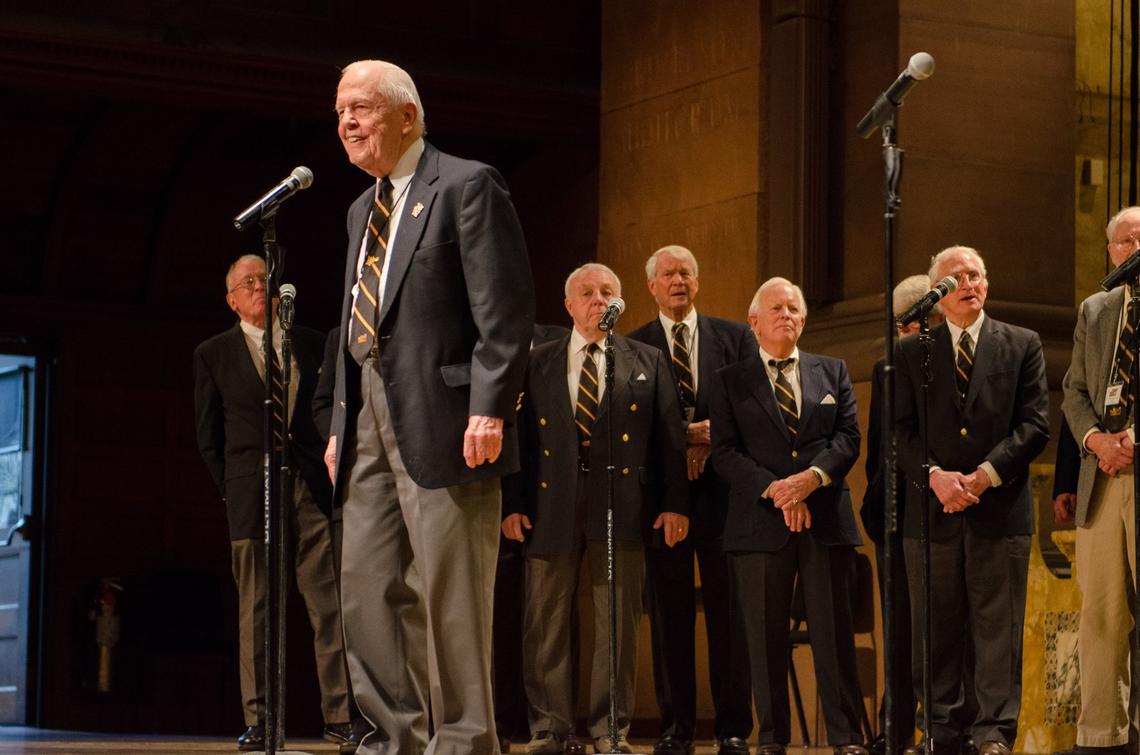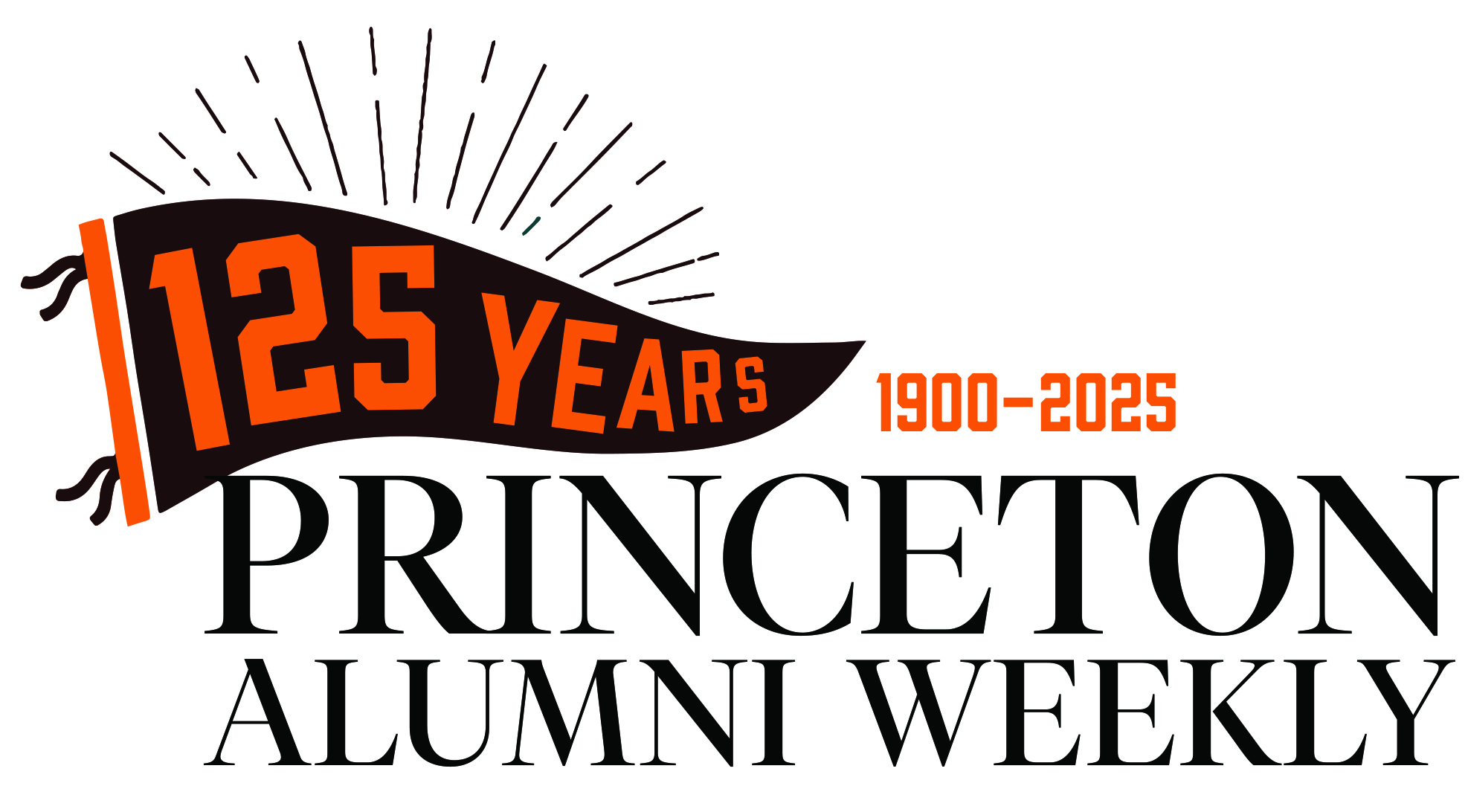
Alumni of the Nassoons returned to campus in April to celebrate the 75th anniversary of the group that gave birth to a cappella singing at Princeton. We spoke with several members about their favorite memories of performing, touring, and rehearsing in the ’Soon Room.
PAW Tracks is also available on iTunes — click here to subscribe
It may be hard to believe, but at Princeton, there was a time before a cappella.
In 1941, a group of seven undergrads landed a gig in the Glee Club’s November concert at Yale. The crowd loved their close-harmony singing, and the Nassoons were born.
Seventy-five years later, Nassoons alumni spanning seven decades returned to campus for a weekend of singing and socializing. PAW visited the reunion’s headquarters to speak with several of the returning ’Soons.
Sandy McAdoo ’71: My name is Sandy McAdoo. I’m a member of the Class of 1971, and I have been the president of the Princeton Nassoons Alumni Association for the past seven years.
When people sing together, there is an immediate connection. Among Princetonians, there is an immediate connection. Then you winnow that down among Nassoons of all years, and there’s even a more immediate connection.
At the 70th reunion five years ago, [original Nassoon] Jack Huyler ’42 was still living. We’ve always hoped to get as many of the Old Guard, particularly when the founders were still living, to come back. He expressed some interest. We found a way to provide some assistance for him and his daughter, and they came I think from Colorado. They came into Princeton by train. Jack was wheelchair-bound, and he got off the PJNB in Princeton and was greeted by the undergraduates who sang to him as he got off the train. At the annual dinner, the Old Guard sang first. He was right in the center in his wheelchair and I can’t remember the song he sang, but he sang a solo and just belted it out.
Howard McMorris ’66: My name is Howard McMorris, Class of 1966. I’m called “Mac” in the Nassoons. We never took major overseas trips. The only trips we took were weekend trips driving through New England to sell records at girls’ prep schools so we could make money. Then we would have one vacation in St. Thomas or something like that.
Jerry Ford ’54 *59: I’m Jerry Ford, Class of ’54. To my way of thinking, my experience as a Nassoon was probably the most important experience in my undergraduate life, and it’s continued to be an important experience. When you practice five days a week and then go off on weekends, in those days to girls’ colleges, it was our life.
They invited us, so they were anxious to hear us sing. Nowadays these guys have got a hunk of change when they perform, but in our time we were happy to get a bottle of whiskey and gas mileage and a blind date. Sometimes they were terrific, sometimes they weren’t, but we usually got pretty good attention.
We don’t use microphones, so you’ve got to be quiet to listen to us. I remember a good friend of mine said sometimes it’s like if a tree falls in the forest and there’s nobody there to make a sound. Well the other way around, if the crowd is so noisy they can’t hear you, are you really singing?
While the Nassoons’ travel schedules and set lists have changed, the group’s traditions have been passed down from generation to generation, both in songs and stories.
Matt Dearth ’92: I’m Matt Dearth, Class of ’92. We were just talking about this in the room because one of the older alums, David Watts, Class of ’62, poked his head in. I went to high school with his daughter. She was a year behind me. So when he heard from his daughter that I was going to Princeton – and she was a singer and I was a singer in high school – he said, “You’ve got to come over.” So I went over to his house, and he played two Nassoon recordings and gave them to me and said, “You’re going to be a Nassoon. You’ve got to do this. It’s the best thing ever. And if you’re a Tigertone I’ll kill you.” So I went to Princeton full-on expecting that that’s what I had to do. Surely, it must be awesome because he told me it was.
Eric MacGilvray ’93: Eric MacGilvray, Class of ’93. The cool thing about the Nassoons, and this is like a lot of Princeton student groups I think, is it’s totally DIY, it’s totally student-run. Those big international tours, we’re booking the shows, we’re booking the plane tickets, we're figuring out where we’re going to stay, we’re figuring out what the itineraries are. That’s all done by usually one or two of the guys.
Dearth: Can you imagine how much easier it is to do that now, with the Internet?
MacGilvray: With the Internet? Yes, we were sending out letters in envelopes. It really was this kind of like, training and leadership and initiative and logistics. The fact that we pulled it off three or four times a year was actually pretty amazing.
Alumni recalled notable milestones in the Nassoon experience, including the moment when you find out you’re in the group.
Angus Worthing ’97: I’m Angus Worthing, Class of ’97. The moment I was told was early in the morning after the group had stayed up most of the night deciding about whom to let into the group. They burst into your room singing, and all your roommates wake up, and they’re kind of excited for you even though it’s really early in the morning. It’s just a terrific moment to be a Nassoon and suddenly to have all the Nassoons in my room, a lowly freshman who just hours before wasn’t in the group.
Eric Westendorf ’94: I’m Eric Westendorf, Class of ’94. At the end, there’s a final night as you get to the end of Reunions, where you’ve been performing for alumni. There’s this one arch that we go to and sing, frankly, for hours. But it’s different this time, because you actually know that for the seniors this is it. This is their last night as part of the group. I remember how bittersweet that was. There’s this deep sense of gratitude and appreciation for being part of it, and also a sense that it’s now time to move on and leave, and how sad it is, but also how touching it is to have these people, and remembering the year before when seniors left and the year before that, and it’s now your turn.
Worthing: You go through challenges, fun experiences, very funny moments, sad moments, all together on tour across the country or across the world or at a show. Things fall apart in singing and entertainment. You learn to adapt, and you learn those leadership skills that you can get in a group, while you’re of course growing up between 18 and 22.
Westendorf: The way you spend those days, too. The fact that it’s always at the end of the day, rehearsals from 10:30 to midnight. You’ve had your day, and it’s almost like you’re coming together to be together for the final hours of the day. There’s this ritual of getting a chance to share with one another different highlights of the day, or funny things that happened, and then you right away go into song. There’s something pretty sacred about ending the day singing and making music together with people you care about, and then going back to your rooms. To have that ritual happen so many days, so many weeks, years, it just gets inside you. It sort of feels like it becomes part of who you are.
Richard Todd ’94: I’m Richard Todd, Class of ’94. The Nassoons used to do this, I don’t know if they still do it: They would have the Nassoons drive the golf carts for the Old Guard in the P-rade. My freshman year, our oldest Old Guard guy was Arthur Holden, Class of 1912. I remember when he stood up, he was blind, and he gave a speech. They asked him, “In your wisdom as the oldest living alumnus, give us a tip.” He said that the most important thing from Princeton for him was friendship. At the time I thought, “What a damned old country club. All those guys cared about was their social connections,” and things like that. They were all white men, and they discriminated against Jews and all that back in the day. Twenty-five years later, I say Arthur Holden was dead on right.
I can’t tell you what classes I took sophomore year. I can’t tell you who all my professors were. I can’t tell you who my preceptors were. But it’s a total trip because there are these songs that I don’t sing, ever. Why would you? Especially a bass part is a stupid thing to sing by itself. There are no words. It’s just all these little syllables. It’s really fun to have those things immediately come back on line when you sing it with somebody else.
I think that so often in life, we have friendships and then we move on past them and then that chapter of the book is closed. This is almost more like a player piano scroll, where you get to write a little bit more in each sentence and the story keeps going on.
Our thanks to all of the Nassoons alumni who shared their stories, and in particular to Doug Roberts ’97, for coordinating the interviews. Brett Tomlinson produced this episode. Allie Wenner helped with the interviews. The music was recorded in a rehearsal featuring Nassoons alumni, primarily from class years in the 1950s and ’60s.


